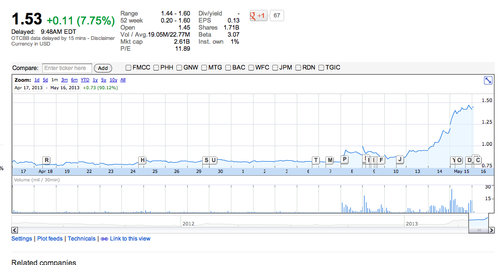Not A Fan Of Fannie Mae And Freddie Mac Fannie Mae (OTCMKTS FNMA)
Post on: 11 Май, 2015 No Comment

Summary
- Lawsuits are progressing through the courts. Positive strides for the investors, but far from winning their freedom from the government.
- $5.4 billion in dividends from the Second Quarter, 2014 will be paid to the U.S. Treasury.
- Expect increased regulations on GSEs and all financial companies.
- Betting on Fannie and Freddie remain a high risk/high reward investment.
On August 7, 2014 Fannie Mae ( FNMA ) and Freddie Mac ( FMCC ) released their second quarter results and posted $3.7 billion and $1.9 billion in earnings respectively to be paid to the U.S. Government as dividends. $5.4 billion dollars will be transferred to the U.S. Treasury for this quarter’s dividend payment. This is without paying anything toward the initial loan the GSEs borrowed to remain liquid during the financial crisis of 2007-2008.
The focus of this article is based on what do the private investors receive? As of today, the Federal government holds 100% of the senior preferred shares. The senior preferred shares receive 100% of the dividend based on the 2012 adjustment nicknamed the Sweep Amendment. The old preferred shares are now referred to as the junior preferred shares, and they receive nothing. The common shares are still the common shares, and they receive nothing.
In the current state of affairs, there is no change to how the government is doing business. Right or wrong, the current administration will continue with the current process. Congress has several options put forth by various members, but no one plan has developed any support to move forward. There is no political force strong enough to push the issue through the system to change the current laws. There is no current political will in the political system during this election year to make any changes.
Neither the Administration nor Congress will change the current situation; the courts are the only avenue left to force a change. The administration has an overwhelming group of legal counsel to fight in the courts and will drag the process out for years.
There were at one time over 20 various lawsuits with as many complaints about various aspects of the conservatorship in the management of the GSE’s. Some have been combined, some dropped, some rejected by the courts, but most of the high profile cases are making their way through the court systems.

Several high profile legal spokesmen have commented on the legality of the current situation, which gives the investors hope to win freedom from the government. I agree with their position that the government may have crossed the line on its conservatorship role, and that they should establish standards for all financial institutions to conduct business, and that the federal government should never have gotten into the role in the first place. The bottom line is we hope the courts direct the government to get out of the role of conservator as soon as possible.
Here lies the problem. The courts could direct the government to return the GSEs to their shareholders as soon as possible, but would need the Legislative Branch in coordination with the Federal Reserve to edit, write, or rewrite standards for the GSEs and other companies to conduct business for the prevention of the next financial crisis. Coordination and cooperation from government branches like this would be challenging at best.
What We Expect:
It will take several years for the lawsuits to get through the courts. We expect the investors’ lawsuits to win the right to return control to their shareholders. We do expect the courts to tell the Federal government that their senior shares, the warrants and any other claims to the ownership will be voided, but the government can keep all the past money it extracted from the GSEs.
We expect additional and more stringent rules for loans to be approved by the GSEs. We expect no loan to be for 100% of a home purchase, and ability to repay will be required with income verification. The government will hold the initial loan writer to retain certain responsibilities of the loan in case of default, and all companies and GSEs will be required to hold a higher percentage of cash equivalents on hand. Some of these are already implemented, where we anticipate the rules will get more stringent.
Investors holding the junior preferred will relapse to just the preferred shareholders, and the common shares will continue as common shares. Investors of both of these shares will not receive any dividend payouts until this is settled years into the future. In 2012, the price of Fannie and Freddie common shares dipped below one dollar in value and now Fannie is hovering around the four dollar mark. We are likely to see the stock prices appreciate in value as the courts move forward and get closer to a settlement date. Some reports claim the stock could climb to $20 or even as high as $60 per common share. Low balling this even to $20 per share would present an investor with a 5x increase in the common share price. If it takes 5 years, that would be an average of 100% each year.
The unknown includes the regulations and requirements that would likely handcuff the GSEs in their ability to make profits and share with investors. There could be additional taxes for GSEs to pay as insurance against defaults. There are many other options, too numerous to identify, but could affect the end result of the GSEs being returned to the shareholders in a profitable way.
This looks like a shiny object many investors will flock to. It may be profitable in the future at some point. This is the unknown. What we do know is there are several opportunities in the market today that are paying a solid 10% or better return that is less risky. Most of our readers understand investing is not about getting rich quick. There are opportunities like the GSEs that may win in court and grow 500% in the next 5 years. There is a high amount of risk here and investors would be wise to not put all their pennies in the hope that this pans out. Even (WHEN) investors win in the courts, there is no guarantee the GSEs will be profitable after the new government regulations are created.
Disclosure: The author has no positions in any stocks mentioned, and no plans to initiate any positions within the next 72 hours. The author wrote this article themselves, and it expresses their own opinions. The author is not receiving compensation for it (other than from Seeking Alpha). The author has no business relationship with any company whose stock is mentioned in this article.
Additional disclosure: I do not own stock in either GSE, as I feel the risk exceeds my desired investment risk tolerance level. I do not fault those willing to take the additional risk.
Editor’s Note: This article discusses one or more securities that do not trade on a major U.S. exchange. Please be aware of the risks associated with these stocks.














